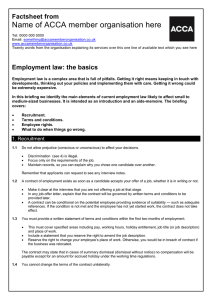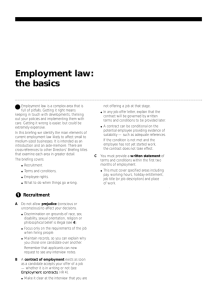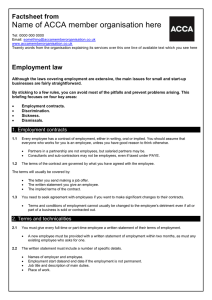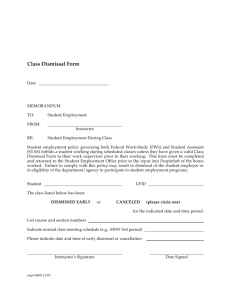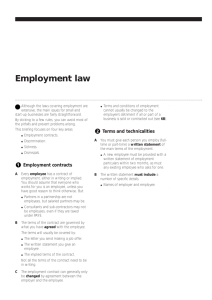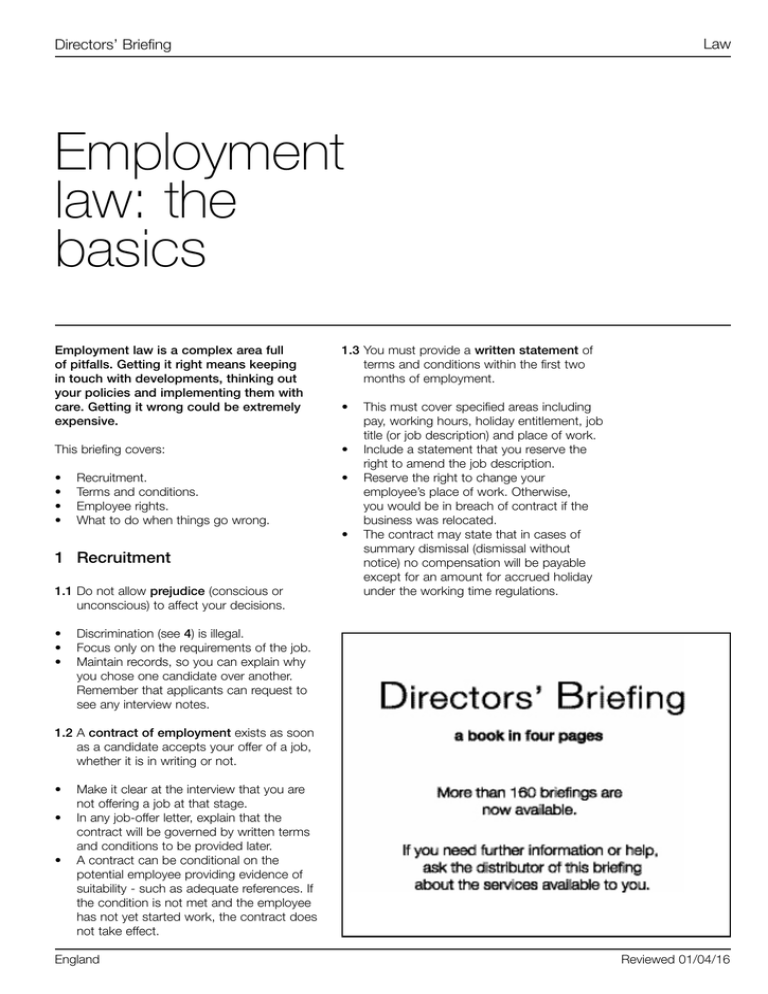
Law
Directors’ Briefing
Employment
law: the
basics
Employment law is a complex area full
of pitfalls. Getting it right means keeping
in touch with developments, thinking out
your policies and implementing them with
care. Getting it wrong could be extremely
expensive.
This briefing covers:
•
•
•
•
Recruitment.
Terms and conditions.
Employee rights.
What to do when things go wrong.
1 Recruitment
1.1Do not allow prejudice (conscious or
unconscious) to affect your decisions.
1.3You must provide a written statement of
terms and conditions within the first two
months of employment.
• This must cover specified areas including
pay, working hours, holiday entitlement, job
title (or job description) and place of work.
• Include a statement that you reserve the
right to amend the job description.
• Reserve the right to change your
employee’s place of work. Otherwise,
you would be in breach of contract if the
business was relocated.
• The contract may state that in cases of
summary dismissal (dismissal without
notice) no compensation will be payable
except for an amount for accrued holiday
under the working time regulations.
• Discrimination (see 4) is illegal.
• Focus only on the requirements of the job.
• Maintain records, so you can explain why
you chose one candidate over another.
Remember that applicants can request to
see any interview notes.
1.2A contract of employment exists as soon
as a candidate accepts your offer of a job,
whether it is in writing or not.
• Make it clear at the interview that you are
not offering a job at that stage.
• In any job-offer letter, explain that the
contract will be governed by written terms
and conditions to be provided later.
• A contract can be conditional on the
potential employee providing evidence of
suitability - such as adequate references. If
the condition is not met and the employee
has not yet started work, the contract does
not take effect.
England
Reviewed 01/04/16
Directors’ Briefing
2
Working parents
• This can be offset against NICs.
A pregnant woman has a number of rights:
C Fathers, parents and partners have the
right to unpaid time off to attend up to
two ante natal appointments
A Paid time off for ante-natal care.
B 26 weeks’ ordinary maternity leave,
during which all her contractual rights
(except remuneration) continue.
• It is illegal to let a woman return to work
within two weeks of childbirth, or within
four weeks if the work is in a factory.
C 39 weeks’ statutory maternity pay
(SMP) of £139.58 a week, regardless of
length of service.
• Most, if not all of this, may be deductible
from employer’s NI contributions.
• A woman who is ineligible for SMP but
has paid enough NI can claim maternity
allowance from Jobcentre Plus.
D Up to 26 weeks’ additional maternity
leave, during which all her contractual
rights (except remuneration) continue.
E The right to return to work early and
share her remaining statutory leave and
pay with her partner as Shared Parental
Leave (SPL).
• To qualify for SPL, the child’s mother
(or adoptive parent) must be eligible for
either maternity leave or pay; Maternity
Allowance; or adoption leave or pay.
• Parents can take shared parental leave
at the same time, but each parent's
leave counts towards the overall
allowance.
F The right to return to work up to one
year after having the baby.
G The right to claim automatic unfair
dismissal and sex discrimination if she
is dismissed for any reason to do with
the pregnancy or childbirth.
• If she is dismissed, you must give her
written reasons for the dismissal.
Fathers also have a number of rights:
A Two weeks’ paid ordinary paternity
leave.
Employees who adopt a child are entitled to
the same leave and pay.
1.4You cannot change the terms of the
contract unilaterally.
• Altering fundamental terms and conditions
without the employee’s consent can be
a breach of contract. Unless the change
benefits the employee, you could be
sued for constructive dismissal, breach of
contract, or both.
2 Hours, leave and pay
“
Apart from
careful recruitment,
probably the
best methods of
preventing legal
disputes with your
employees are
training and regular
performance
appraisals.
Liz Trumper,
management
consultant
”
2.1You must comply with statutory
requirements on working hours and leave.
• Most employees are entitled to work a
maximum 48-hour average working week.
Employees can voluntarily agree in writing
to disapply the rules. Pressuring workers to
agree to disapply the limit is a breach of the
working time regulations.
• Employers may consult on and agree a
system of annualised hours whereby the
total number of hours worked do not
exceed an average of 48 hours per week
over a period of one year.
• Time spent travelling to the first and last
client of the day now counts as working
time for workers with no fixed place of
work.
• There are detailed regulations on minimum
rest periods.
• Employees are entitled to a minimum of 5.6
weeks’ paid leave a year.
• Employees can also be entitled to maternity
leave, paternity, shared parental or adoption
leave, parental leave and leave for family
reasons. The latter two are unpaid, and
there are limits on how much can be taken
and when.
• All employees with at least 26 weeks’
service have the right to make a request for
flexible working.
• Part-time workers have the right to be
treated no less favourably than full-timers.
So, for instance, part-timers are entitled to
holiday on a pro rata basis.
• This must be taken within 56 days of the
birth (or the EWC if the birth is early).
2.2Employees have the right to a minimum
wage.
B Statutory paternity pay (SSP) of £139.58
a week or 90% of average pay if lower.
• Employees aged over 25 must be paid the
new National Living Wage of £7.20 an hour.
“
Set up basic HR
systems to save
time and to help
protect yourself
against unwittingly
breaking the
law.
Neil Thomson,
T>Learning and
Development
”
Directors’ Briefing
• The National Minimum Wage stands at
£6.70 an hour for staff aged 21 to 25,
£5.30 for those aged 18 to 20, and £3.87
for employees aged 16 and 17.
• Apprentices under the age of 19, or
older than this but in the first year of their
apprenticeship, must be paid at least £3.30
per hour.
• Service charges, gratuities and cover
charges paid to a worker through payroll do
not count towards NMW.
3
3.5Employees are entitled to protection
against discrimination (see 4).
3.6Employees are entitled to blow the whistle
on their employer’s wrongdoings.
• If they are subsequently sacked or
demoted, they can sue for full
compensation - there is no monetary limit for any losses incurred.
3.7Each employee must get a pay statement.
2.3Employer’s National Insurance (NI)
contributions are payable on employees’
pay and taxable benefits.
2.4You must deduct your employees’ tax and
NI contributions from their wages, and pay
them to HM Revenue & Customs under
PAYE (Pay As You Earn).
2.5You also have to account for employees’
tax and NI on most benefits in kind.
• This must show total gross pay, deductions
and net pay.
• Deductions (eg pension contributions and
union subscriptions) must be itemised.
3.8All employees with more than one month’s
service are entitled to a notice period.
• Some benefits are free of tax and NI.
• The statutory minimum is one week (after
one month’s service), rising to two weeks
after two years, with a maximum of 12
weeks after 12 years.
3 Employee rights
3.9Most employees are entitled to keep their
jobs even if the business changes hands.
Employees have some rights which are implied
(but not spelt out) in their contracts. They also
have rights which the contract cannot override.
• In most cases, sackings would constitute
unfair dismissal under the TUPE
Regulations.
3.1Employers must not take any action which
might undermine the relationship of ‘trust
and confidence’ with their employees.
3.10 Employees are entitled to have discipline
and grievance issues dealt with using ‘fair
and reasonable’ procedures. See the Acas
Code of Practice at www.acas.org.uk.
• Employees have reciprocal obligations to
serve the employer honestly and faithfully
and to work with due diligence and care.
3.2Employers must provide a secure, safe and
healthy working environment.
3.3Employees have the right to belong (or not
to belong) to a trade union.
• Unions must be recognised (in businesses
with 21 or more employees) where a
specified percentage of the workforce votes
for recognition.
3.4Employees are entitled to a reasonable
degree of privacy.
• The circumstances under which employers
may monitor phone calls, emails or internet
use are regulated under the Data Protection
Act and the Regulation of Investigatory
Powers Act.
4 Discrimination
4.1Treating someone less favourably because
of their race, sex or gender reassignment,
age, disability, sexual orientation, religion,
philosophical belief, membership or
non-membership of a trade union, marital
or civil partnership status, pregnancy,
maternity, care responsibilities or part-time
status is illegal.
4.2Indirect discrimination occurs if you
impose a ‘provision, criterion or practice’
which members of one sex or one racial
group are much less likely to be able
to comply with, and which cannot be
objectively justified.
4.3If you treat someone less favourably
because of their actions (or potential
actions) in connection with discrimination
proceedings, it could count as victimisation.
➨ Employees
adopting
‘employee-owner’
or ‘employeeshareholder’ status
give up some of
their employment
rights in exchange
for shares in
the business.
Employee-owners:
are not eligible
for statutory
redundancy pay;
are not entitled
to ordinary
unfair dismissal
protection; must
give 16 weeks’
notice (instead of
the normal eight) if
they want to return
early from maternity
or adoption leave;
do not have the
statutory right to
request flexible
working or to
protection against
dismissal for
making a request
for flexible working
(except in relation
to requests to
work flexibly on
return from parental
leave).
Directors’ Briefing
4.4For people with disabilities, you must be
prepared to make ‘reasonable adjustments’
to enable them to work.
• In some circumstances, you may be
justified in refusing to make adjustments.
4.5You can no longer compulsorily retire
employees.
4.6As an employer, you are responsible for
any discrimination practised by you or your
employees.
5 Sickness
5.1You must pay statutory sick pay (£88.45
per week) to qualifying workers (including
part-time, full-time and agency workers) for
up to 28 weeks.
• Workers qualify from the fourth day of
incapacity onwards.
• They must earn more than the lower
earnings limit of £112 per week.
• You can withhold SSP under certain
circumstances.
5.2Many employers pay higher levels.
• It is common to continue with full pay for a
given period, often up to six months.
5.3If a worker’s continued or repeated
absences are causing problems, you may
be able to end their employment.
• You must be able to prove your actions
were reasonable.
5.4The ‘fit note’ is issued by doctors and will
indicate whether an individual:
• is not fit for work
• may be fit for work
A ‘may be fit for work’ note means a doctor
believes the condition may allow them to
work if given appropriate support.
• Employees in England and Wales who
are off work for four weeks or more
can be referred to the ‘Fit for Work’
scheme (fitforwork.org). It offers free,
occupational-health advice to help them
return to work.
4
6 Disciplinary issues
6.1Make sure you have disciplinary and
grievance procedures in place which
conform to the Acas Code of Practice
(www.acas.org.uk).
• Include basic disciplinary and grievance
information in your written terms and
conditions.
• Make sure employees know what offences
merit disciplinary action, and apply the rules
consistently.
6.2If you have to dismiss an employee, you
may have to prove that you had good
cause - such as gross misconduct or
incompetence - and that you acted fairly
and reasonably.
➨Employment law
is complex and
changing rapidly.
This briefing reflects
our understanding
of the basic
legal position as
known at the last
update. Obtain
legal advice on
your own specific
circumstances and
check whether any
relevant rules have
changed.
• Inability to do the job because of frequent
or prolonged absences due to sickness or
injury might be grounds for dismissal.
• Redundancy might also be grounds for
dismissal. But the reason must be genuine
and the selection fair. Processes and
timescales are carefully prescribed, and it is
essential to follow them.
6.3Unlawful dismissal could land you in front
of a tribunal.
• It is illegal to dismiss anyone on grounds
of race, sex, disability, sexual orientation,
pregnancy or age. There is no statutory
upper limit on the amount of compensation
that can be awarded in such cases.
• You can no longer retire employees unless
there is a fair reason or it can be objectively
justified. You must follow a fair procedure.
6.4 An employee can claim unfair dismissal
if he or she has been dismissed for an
‘unfair’ reason or if unfair procedures are
followed. In general, they must have two
years’ service.
• If you have breached a fundamental term
of the employment contract, or made it
impossible for employees to do their job, they
can sue for ‘constructive’ (unfair) dismissal.
• Employees must raise a grievance first and
you have 28 days to respond.
• The basic award can be up to £14,370
and compensation for financial loss up to a
maximum of £78,962.
Published by Atom Content Marketing Ltd, CityPoint, Temple Gate, Bristol, BS1 6PL
Tel: 0117 373 6160, http://atomcontentmarketing.co.uk
© Atom Content Marketing
Ltd 2016. ISSN 1369-1996.
All rights reserved. No
part of this publication
may be reproduced or
transmitted without the
written permission of the
publisher. This publication
is for general guidance
only. The publisher, expert
contributors and distributor
disclaim all liability for
any errors or omissions.
Consult your local business
support organisation or your
professional adviser for help
and advice.

